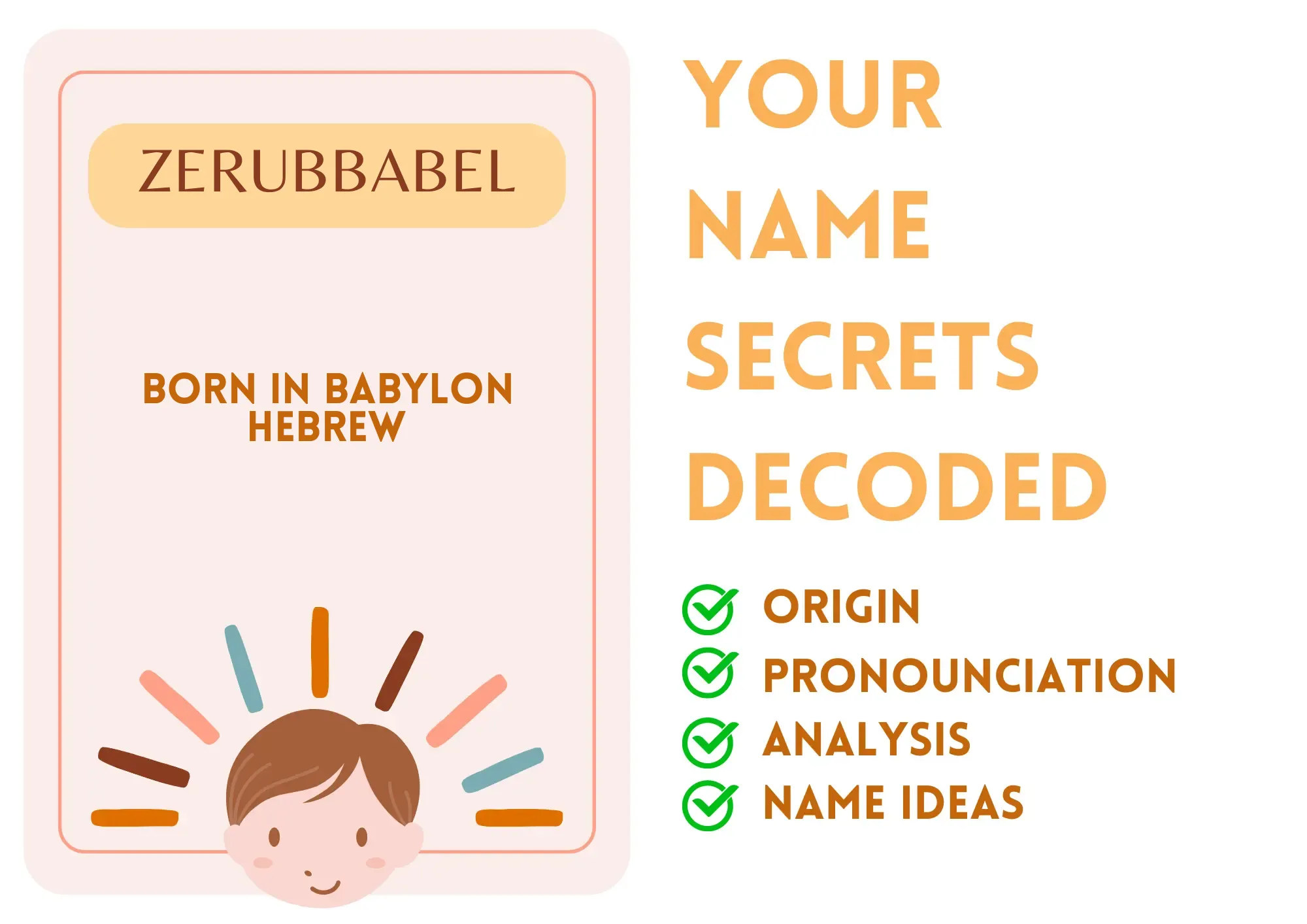
Zerubbabel
Zerubbabel is a unique and significant name of Hebrew origin, meaning 'born in Babylon' or 'sown in Babylon.' It carries historical weight as a biblical name, associated with the figure who returned from Babylonian exile to lay the foundation of the Second Temple in Jerusalem. The name holds profound importance in Jewish culture and history, symbolizing restoration and divine purpose.
Primarily used in religious contexts, Zerubbabel is traditionally male. The name evokes a sense of strength, resilience, and hope, reflecting the journey and struggles faced by the Jewish people. Although challenging to pronounce and write, Zerubbabel is well-regarded for its rich meaning and historical significance.
Zerubbabel appears in various biblical texts and is occasionally referenced in literature and art, particularly in discussions of Jewish history and heritage. While not common in modern naming practices, it is appreciated for its uniqueness and depth.
Basic Information
Gender: Boy
Sounds Like: zeh-ROO-bah-bel
Pronunciation Explanation: The name has three syllables, with the emphasis on the second syllable 'ROO', pronounced like 'roo' in 'kangaroo'.
Summary and Meaning
Meaning: born in Babylon (Hebrew)
Origin: The name Zerubbabel has Hebrew origins and is prominent in Jewish scripture.
Usage: Zerubbabel is traditionally a male name, associated with a prominent male biblical figure.
Name Number (Chaldean)
Name Number (Pythagorean)
Popularity (Global Rank)
Overall: 206887
Boys: 72681
Most Popular in
Religious and Cultural Significance
Religion: Judaism
Background: In Judaism, Zerubbabel is a significant character in the Hebrew Bible, known for leading the effort to rebuild the Temple in Jerusalem.
Cultural Significance: Zerubbabel represents hope and restoration after exile, making the name historically significant among Jewish communities, particularly when commemorating heritage.
Historical Significance: Zerubbabel was a leader during the return from Babylonian exile, playing a crucial role in reestablishing the Jewish community and promoting temple worship, reflected in the book of Ezra and Haggai in the Bible.
Popular Culture
Literature and Mythology: Zerubbabel appears in various biblical texts and is often referenced in discussions regarding themes of exile, restoration, and faith in literature.
Movies and Television: While Zerubbabel is not a common character in mainstream movies, references to his historical role appear in religious documentaries and themes surrounding the restoration of Jerusalem.
Feelings and Perceptions
Perception: Zerubbabel is generally perceived as a strong and meaningful name, often viewed with respect in religious circles. It is associated with determination, faith, and historical significance.
Positive Feelings: Unique, historical, profound, resilient, meaningful.
Negative Feelings: May be seen as overly complex for modern naming conventions; pronunciation challenges could lead to discomfort.
Practical Considerations
Ease of Writing and Calling: Zerubbabel is relatively complex to write and pronounce, consisting of ten letters and four syllables. Its length and uniqueness may pose challenges in casual contexts.
Common Typos and Misspellings: Zrubabel,Zerubbbal,Zerubabel,Zarababel
Common Nicknames: Zeru,Zeb,Z
Zerubbabel Popularity
Zerubbabel Usage and Popularity By Country
| Country | Rank (Overall) |
|---|---|
| Malawi | 5294 |
| Ghana | 6105 |
| Zimbabwe | 6151 |
| Ethiopia | 12337 |
| Uganda | 20326 |
| Niger | 20692 |
| Qatar | 21780 |
| Norway | 27537 |
| United Kingdom | 51751 |
| United Arab Emirates | 67985 |
Zerubbabel Usage and Popularity By City
| City | Rank (Overall) |
|---|---|
| Madison | 4679 |
Compatibility Analysis
Famous Persons Named Zerubbabel
No results found for Zerubbabel.
Related Names
Similar Sounding Names:
Zebulon,Zachariah,Zerach,Zerah